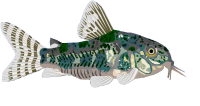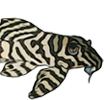Pimelodus tetramerus: Loss of barbels
- Acanthicus
- Posts: 870
- Joined: 24 Jan 2011, 14:32
- My articles: 5
- My images: 92
- My cats species list: 29 (i:0, k:0)
- Spotted: 80
- Location 1: Kiel
- Location 2: Germany
- Contact:
Pimelodus tetramerus: Loss of barbels
Hi,
three months ago I got 6 Pimelodus tetramerus, quite a rare catfish.
Two weeks ago I lost one, the biggest one. I couldn´t figure out the reason for its death, but the belly was really huge. So I guess this could be the reason, the night before I fed them with fish. Maybe he ate to much.
Yesterday I realized that two others lost their barbels. They are now about 2cm, before more or less 6-8cm.
I keep them in a tank without sand or gravel, cause I am moving a lot at the moment. No light, no plants. But plenty of wood and places to hide. All eat normal and move like always. They don´t look sick or something.
Might the missing gravel be the reason?
Bacteria?
Thanks, Daniel
three months ago I got 6 Pimelodus tetramerus, quite a rare catfish.
Two weeks ago I lost one, the biggest one. I couldn´t figure out the reason for its death, but the belly was really huge. So I guess this could be the reason, the night before I fed them with fish. Maybe he ate to much.
Yesterday I realized that two others lost their barbels. They are now about 2cm, before more or less 6-8cm.
I keep them in a tank without sand or gravel, cause I am moving a lot at the moment. No light, no plants. But plenty of wood and places to hide. All eat normal and move like always. They don´t look sick or something.
Might the missing gravel be the reason?
Bacteria?
Thanks, Daniel
Daniel
- Acanthicus
- Posts: 870
- Joined: 24 Jan 2011, 14:32
- My articles: 5
- My images: 92
- My cats species list: 29 (i:0, k:0)
- Spotted: 80
- Location 1: Kiel
- Location 2: Germany
- Contact:
Re: Pimelodus tetramerus: Loss of barbels
When the one died, there was a Acanthicus adonis with them in the tank (200 litres). But it is is completely harmless against the Pimelodus. Since a week the Acanthicus is in an other tank.
Daniel
-
Viktor Jarikov
- Posts: 5613
- Joined: 26 Jan 2010, 20:11
- My images: 11
- My cats species list: 25 (i:0, k:0)
- Spotted: 4
- Location 1: Naples, FL
- Location 2: USA
Re: Pimelodus tetramerus: Loss of barbels
Can you please snap a pic or two, Daniel?
Thebiggerthebetter
fish-story.com
fish-story.com
- Acanthicus
- Posts: 870
- Joined: 24 Jan 2011, 14:32
- My articles: 5
- My images: 92
- My cats species list: 29 (i:0, k:0)
- Spotted: 80
- Location 1: Kiel
- Location 2: Germany
- Contact:
- sidguppy
- Posts: 3827
- Joined: 18 Jan 2004, 12:26
- My articles: 1
- My images: 28
- My aquaria list: 5 (i:0)
- Spotted: 9
- Location 1: Southern Netherlands near Belgium
- Location 2: Noord Brabant, Netherlands
- Interests: African catfishes and oddballs, Madagascar cichlids; stoner doom and heavy rock; old school choppers and riding them, fantasy novels, travelling and diving in the tropics and all things nature.
- Contact:
Re: Pimelodus tetramerus: Loss of barbels
I think your water quality went down the hatch caused by using feeders, then the bad water quality caused both a nitrite spike killing your biggest fish (the bloated belly's a give away) and the growth of the wrong kind of bacteria; and that bad water quality is now causing loss of whiskers in the other 2.
Pimelodus don't need feeders. they can be kept perfectly on flake food, granules and a range of smaller frozen foods like krill, mysis, bloodworms etc
also: don't overfeed them. overfed fish often suffer from bad water as well.
polluted water caused by too much food and waste products thereof and inadequate filtering/waterchanges kill more ornamental fish than all the aquatic diseases together!
Pimelodus don't need feeders. they can be kept perfectly on flake food, granules and a range of smaller frozen foods like krill, mysis, bloodworms etc
also: don't overfeed them. overfed fish often suffer from bad water as well.
polluted water caused by too much food and waste products thereof and inadequate filtering/waterchanges kill more ornamental fish than all the aquatic diseases together!
Valar Morghulis
-
Bas Pels
- Posts: 2920
- Joined: 21 Dec 2006, 20:35
- My images: 1
- My cats species list: 28 (i:0, k:0)
- Spotted: 8
- Location 1: the Netherlands
- Location 2: Nijmegen the Netherlands
- Interests: Central American and Uruguayan fishes
Re: Pimelodus tetramerus: Loss of barbels
While I fully agree with sidguppy, I would further like to point out lack of substrate (please use sand instead of gravel) will have 2 adverse effects:
1 sand is a good substrate for good bacteria, which transfer nitrite into nitrate - making the nitrogen a 1000 times less harmfull. In an average tank, a similar number of bacteria is found in the tank vs in the filter - so the tank itself does do guite a lot
2 sand reduces stress, and thus improves all immunity, making the fish less vulnerable for any disease
1 sand is a good substrate for good bacteria, which transfer nitrite into nitrate - making the nitrogen a 1000 times less harmfull. In an average tank, a similar number of bacteria is found in the tank vs in the filter - so the tank itself does do guite a lot
2 sand reduces stress, and thus improves all immunity, making the fish less vulnerable for any disease
cats have whiskers
- Acanthicus
- Posts: 870
- Joined: 24 Jan 2011, 14:32
- My articles: 5
- My images: 92
- My cats species list: 29 (i:0, k:0)
- Spotted: 80
- Location 1: Kiel
- Location 2: Germany
- Contact:
Re: Pimelodus tetramerus: Loss of barbels
Hi you two,
Last question: Will they grow again like we know it from Corydoras?
Thanks!
I don´t think the water quality was that bad when the one died. There were only those six Pimelodus and one Acanthicus in 200 litres. Furthermore I do change 100 litres every third day. And the filter is a good one as well.sidguppy wrote:I think your water quality went down the hatch caused by using feeders, then the bad water quality caused both a nitrite spike killing your biggest fish (the bloated belly's a give away) and the growth of the wrong kind of bacteria; and that bad water quality is now causing loss of whiskers in the other 2.
Yep, I know. I don´t only feed them fish, they get lots of different kind of food. It´s about once a week they get fish and they seem to like it. On the other hand, Pimelodus do like everything they can get into their mouth....sidguppy wrote:Pimelodus don't need feeders. they can be kept perfectly on flake food, granules and a range of smaller frozen foods like krill, mysis, bloodworms etc
This is what I meant, which was my idea as well. So, I gonna put sand into the tank tomorrow. Of course it will be sand, I don´t use gravel in my tanks. Don´t know why I´ve written gravel also.Bas Pels wrote:sand is a good substrate for good bacteria, which transfer nitrite into nitrate - making the nitrogen a 1000 times less harmfull. In an average tank, a similar number of bacteria is found in the tank vs in the filter - so the tank itself does do guite a lot
Last question: Will they grow again like we know it from Corydoras?
Thanks!
Daniel
- MatsP
- Posts: 21038
- Joined: 06 Oct 2004, 13:58
- My articles: 4
- My images: 28
- My cats species list: 117 (i:33, k:0)
- My aquaria list: 10 (i:8)
- My BLogs: 4 (i:0, p:164)
- Spotted: 187
- Location 1: North of Cambridge
- Location 2: England.
Re: Pimelodus tetramerus: Loss of barbels
I have had regular Pimelodus pictus loose a barbel (which I'm sure was poor water quality, by the way, as it happened while I was moving from one house to another, and slightly neglected water changes...). It grew back again, couldn't spot which one after some time. When I moved them, I also had to cut one free from the net by cutting a little bit of the pectoral fin, and a few weeks later, there was no way to tell any difference.
--
Mats
--
Mats




